“This post contains affiliate links, and I will be compensated if you make a purchase after clicking on my links.”
Last Updated on November 20, 2022
A Great Dane’s temperament is basically a smorgasbord of various traits. Theses large canines are exceptionally doting. And they usually portray a calm and controlled demeanor.
If you’ve done your fair share of Great Dane research, we’re sure you’ve come across the term “gentle giant”. Great Danes are often called as such because their intimidating size doesn’t exactly match their temperament.
And it’s hard not to notice these big, beautiful dogs wherever they go. They are majestic, loving and just everything in between! Read on to learn more about Great Dane temperament.
Great Dane Temperament
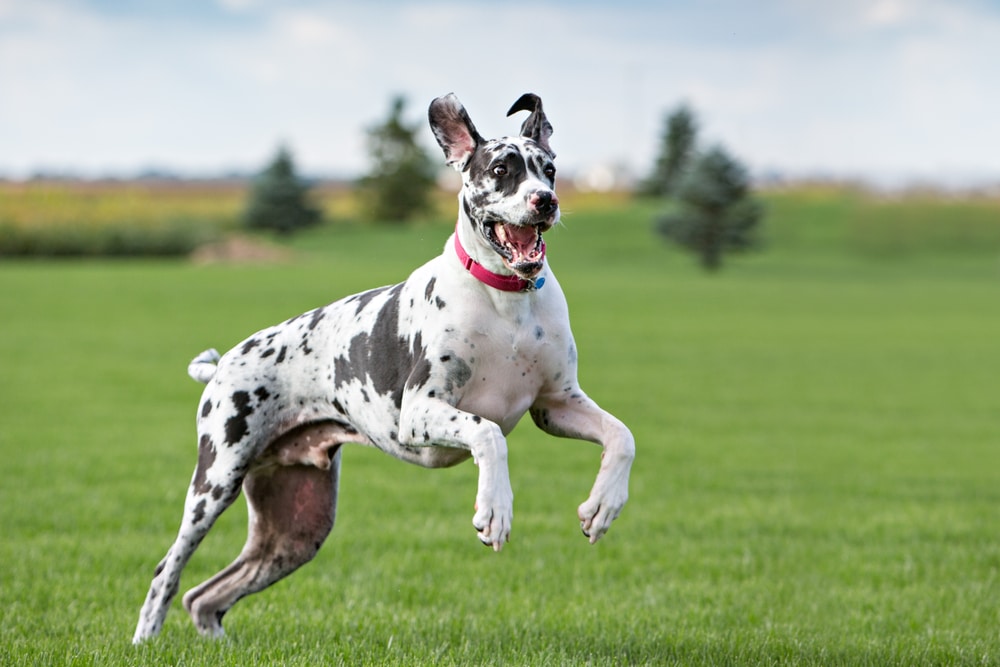
The Great Dane breed comes from one end of the spectrum to the other. And the titles given to them is proof of this. While they’re called “Apollo of Dogs” for their intimidating build, they’re also called “gentle giants” for their gentle temperament.
A Great Dane is an easygoing, calm and docile dog. For their size, they have an unmatched warmth and friendliness towards their owners and strangers. They’re fiercely loyal to their owners and are even gentle and patient with other dogs and children.
And their pleasant and overall good disposition make Great Danes ideal family companions. Even making it to the top 20 of the most popular dog breeds list by the American Kennel Club (AKC ) in 2021.
Great Dane Temperament Traits
These Great Dane temperament traits are widely-accepted generalizations about the breed itself but of course, every Great Dane may behave differently from these norms.
Below, we list down the most common and widely accepted traits that you should know about these beautiful dogs.
1. Gentle and Loving
The first Great Dane temperament trait is its gentleness. These dogs, despite their size, are actually very gentle. They’re gentle, kind and pleasant to be with. And they’re not as moody as other breeds and are, for most part, docile and kind dogs.
They’re also very affectionate towards their owners. This is why even though they’re very big, a lot of families love having them as companions. Their gentle and loving disposition is what makes them great family dogs. And this is what got them the title “gentle giant”.
2. People Pleaser
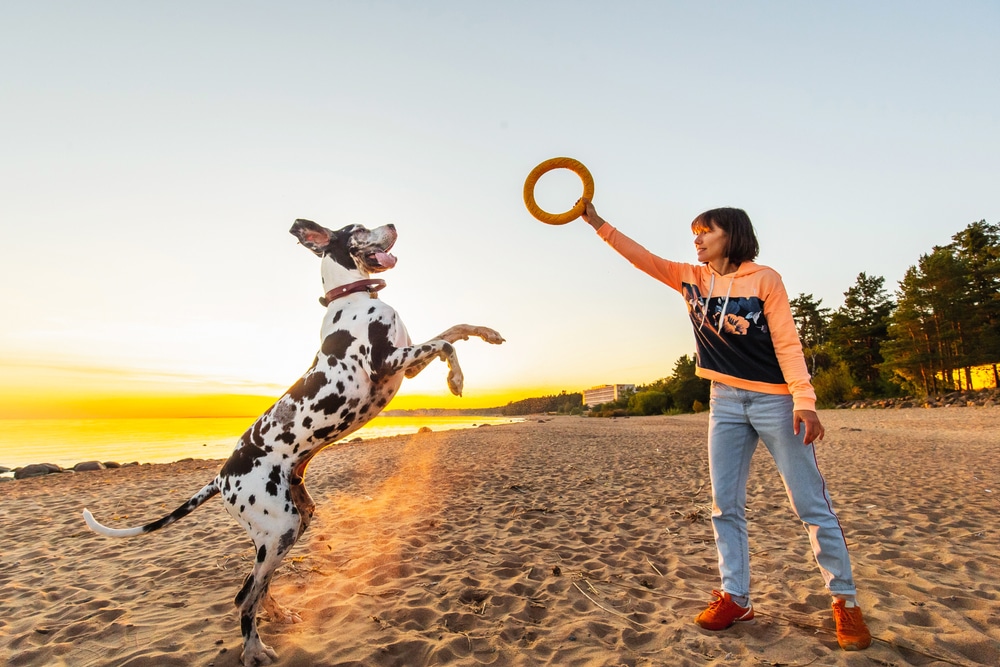
In connection to their gentle and loving trait, Great Danes love their owners so much that they’d willingly do anything to satisfy them. Furthermore, they also love spending time with the people they like.
This certain trait actually gives Great Dane owners an edge when it comes to training. Since the dogs are willing to do anything to make their owners happy, they’ll mostly likely respond to training a lot better compared to other dog breeds.
3. Social and Friendly
Generally, Great Danes are known to be friendly and social, even towards strangers and other dogs they’re unfamiliar with. But of course, such natural trait should still be nurtured. So it is advised to socialize these big, beautiful dogs so they can be well acquainted to new individuals and surroundings.
Around children
Great Danes adore kids. And they can be extra patient with them too, provided the dogs are trained and socialized properly.
However, despite this trait, these big dogs should not be left alone with children. Interactions between your Great Dane and children should always still be supervised by an adult. We think this does not need further explanation as the sheer size of a Great Dane is enough indication.
Around other pets
A Great Dane’s friendliness also extends to other pets, especially dogs. While Great Danes are naturally well-behaved, proper training and socialization is still needed.
4. Playful
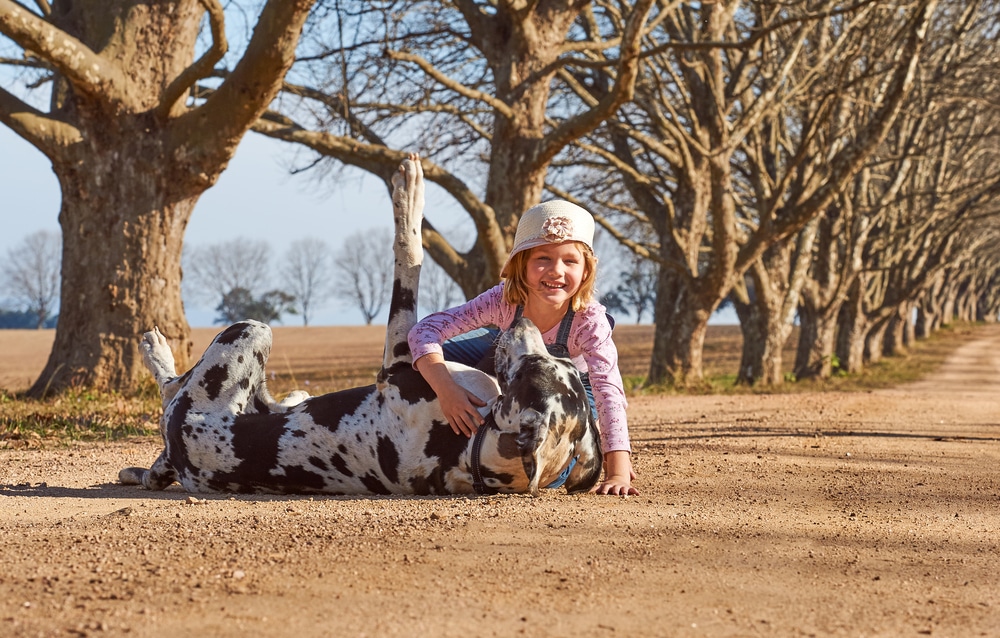
Another Great Dane temperament trait is the dog’s playfulness. Since they’re naturally social and friendly, they are also playful! This is another reason why they adore children. They love playing with them! They enjoy a good play session with both people and other dogs.
Many people even refer to them as the “largest lap dogs” because they like sitting on people’s laps without any thought. They are either too fond of their owners or are just not aware of their enormous size.
A big-time jumper
As playful dogs who are obviously oblivious to their strength and size, Great Danes love jumping during play time. They love to jump on people, fences and other things, such as furniture.
And since they can jump and reach things even on the upper shelves and counter, they become curious about a lot of things – but mostly the food you leave on the counter.
This trait might be cute when they’re puppies, but when a 120lbs Great Dane starts jumping on you or stealing food on the counter, it no longer sounds as adorable.
Usually, enough training and exercise can curb this trait. If your Great Dane has enough exercise, it’d be too tired to start jumping on people and on things. Furthermore, being more vigilant and careful of the things you put on shelves and counters is a must. You might want to consider where you place important things because of this Great Dane temperament.
5. Protective
While they’re easygoing and good-natured, Great Danes are quite protective of their owners. Since they’re very fond of their owners, it’s only natural for these dogs to be protective of the people they love.
The advantage of this Great Dane temperament trait, coupled with the dog’s huge stature, is it makes them excellent watchdogs.
Barking
Great Danes are not incessant barkers and do not bark without reason. But since they can be protective of their loved ones, they can develop a habit of barking. And you would expect their barks to be loud since they are huge dogs.
Without proper training and exercise, this protectiveness and excessive barking can lead to worse traits like aggression. So, ensure that your dog gets socialized and trained properly.
6. Territorial
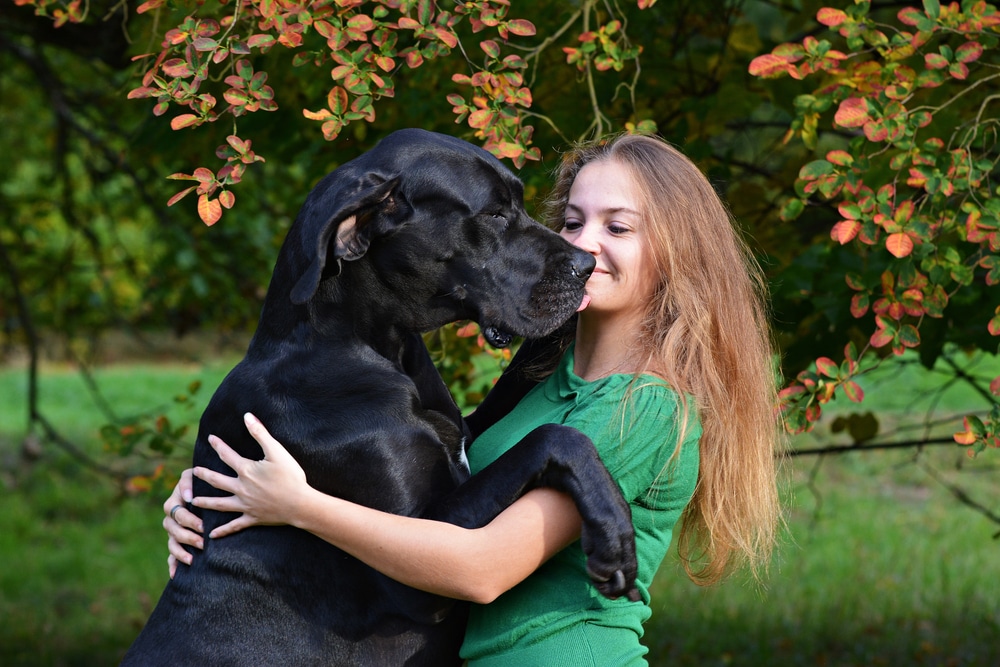
While Great Danes are easygoing and kind, the Great Dane temperament also suggests that these dogs can be extremely territorial and possessive. Whether it be their space, their things or their family, when a Great Dane feels like any of these are threatened, they can become reactive or aggressive.
Being territorial can become a problem when a Great Dane starts reacting negatively more often. With their sheer size alone, they can cause injuries one way or another.
At times, Great Danes become territorial because they perceive any unfamiliar individual or situation to be a threat. And if such behavior isn’t corrected as early as possible, it can lead to aggressive tendencies. But like any traits, being territorial can be curbed with enough training and socialization.
7. Separation Anxiety
As a social and friendly dog, Great Danes are likely to develop and suffer from separation anxiety. Since these dogs love spending most of their time with their owners, they do not like to be alone.
There are instances where separation anxiety is short-term, especially if you just recently bought or adopted a Great Dane. But it can be a long-term problem when the issue is not addressed properly.
Great Danes can be destructive, or worse, aggressive, when left alone at home with their anxiety. But of course, like most traits, separation anxiety can be prevented.
8. Lazy Couch Potato
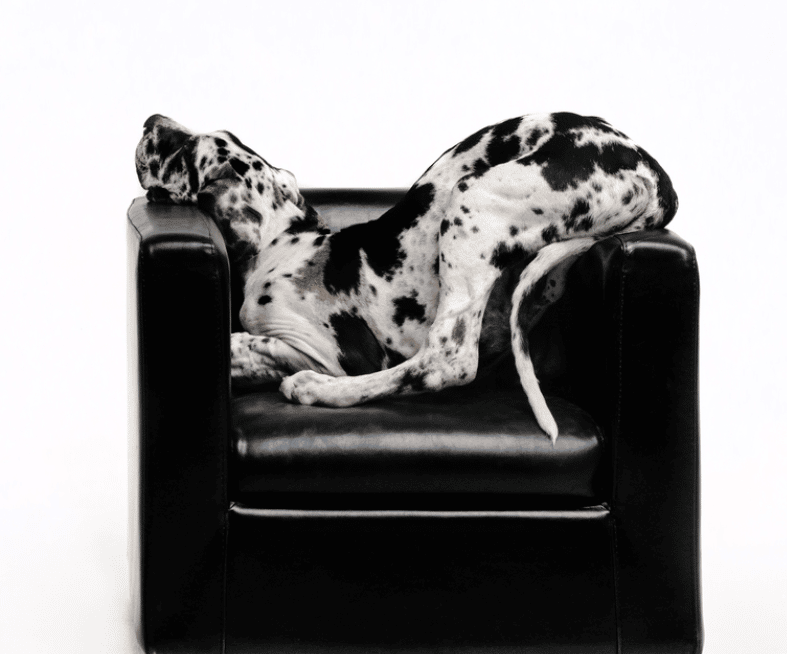
While Great Danes are playful, they are also known to be lazy dogs. Yes, they will enjoy a good play session with children, but only if they can sit around or nap right after play time.
Great Danes are pretty laid-back and are actually considered moderately playful with a low energy level. And to put their “laziness” into perspective, they can sleep a minimum of 14 to 16 hours a day.
They’d rather spend time with you doing nothing than play for most part of the day. And if you have a favorite couch and a Great Dane, then you’ll eventually have to say goodbye to that couch as it will now be your Dane’s!
Exercise
Exercise is necessary no matter what breed your dog is. With Great Danes, all you need is a moderate amount of physical exercise to keep them physically and mentally healthy. And regular walking for one or two hours a day is enough for them.
Great Dane Temperament and Socializing
Great Danes are born with a lot of positive and good traits. However, in order to nurture such traits, socializing them is very important.
Socialization builds and improves a dog’s behaviors. When you expose them to new environments, situations and individuals, they grow up confident and well-behaved. They will learn how to navigate this world without fear and will be able to interact with new situations and people.
If Great Danes are not socialized properly, they can become too territorial, protective and aggressive. Which are behaviors you wouldn’t want for a big dog.
Great Dane Temperament and Lodging
Their size alone might say otherwise, but did you know that thanks to the Great Dane temperament, these dogs are great apartment dogs?
Since they are low-maintenance, easygoing, social and docile, they are perfect for people who live in apartments. And because of this, more and more people in the US that live in apartments are getting Great Danes as companions.
Although, it is important to remember that just like any breed of puppy, Great Dane puppies are more energetic. And raising them can become an initial challenge since the puppy is still growing and developing.
Great Dane Temperament As a Puppy
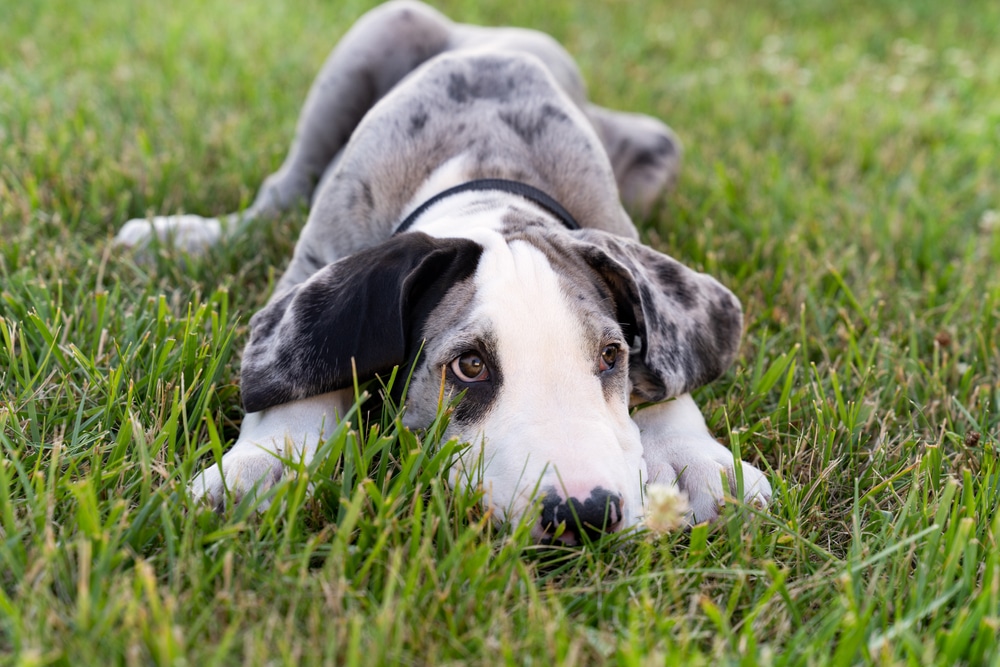
Great Dane temperament as a puppy might differ from an adult Great Dane temperament. For starters, puppies are a lot more energetic and playful than adults. You might also find them stubborn, unruly and naughty.
At this age, training is crucial. And since they can be naughty and mischievous, you have to be patient with them. Proper training takes effort, patience and time but it can be rewarding because it will help them develop good traits and curb the bad ones.
Below, we list down some of the most notable traits of a Great Dane puppy that you need to look out for:
1. Unyielding
Great Dane puppies can be unyielding and stubborn. There is a big chance that your puppy won’t listen to you. And you need a lot of patience and effort to train them. You have to be more persistent and firm in your commands until the puppy realizes that they have to follow and behave you.
2. Destructive
Since Great Dane puppies are a lot more energetic and playful, they can also cause quite a bit of a mess at home. They’ll start biting and chewing on things, like furniture. And they can also develop a habit of jumping on people and things when they get too excited.
3. Unruly
The docility of an adult Great Dane might not be found in a Great Dane puppy. Many owners have observed that these puppies have a more unruly disposition. Their temperament suggests that they have a behavior of being naughty and unruly, much like a human child.
Our Suggestions
Great Dane are naturally easygoing, docile, social, loving and warmhearted canines. While these are all a generalization and widely-accepted traditional traits, the Great Dane temperament still makes the dog an excellent choice for a family companion.
But of course, among many things, you still have to consider the dog’s size and strength. There might be situations when an owner finds some actions cute, like jumping at people or being too unruly. When your puppies grow up and they start jumping at people, it can become a problem. And as mentioned multiple times in this article, it is important that these traits be nurtured through proper training.
Every Great Dane can be different and the overall Great Dane temperament can be molded accordingly through efficacious training and regular socializing.
Therefore, the Great Dane temperament, whether it’s good or bad, can be potently defined by its owners through proper care and training.
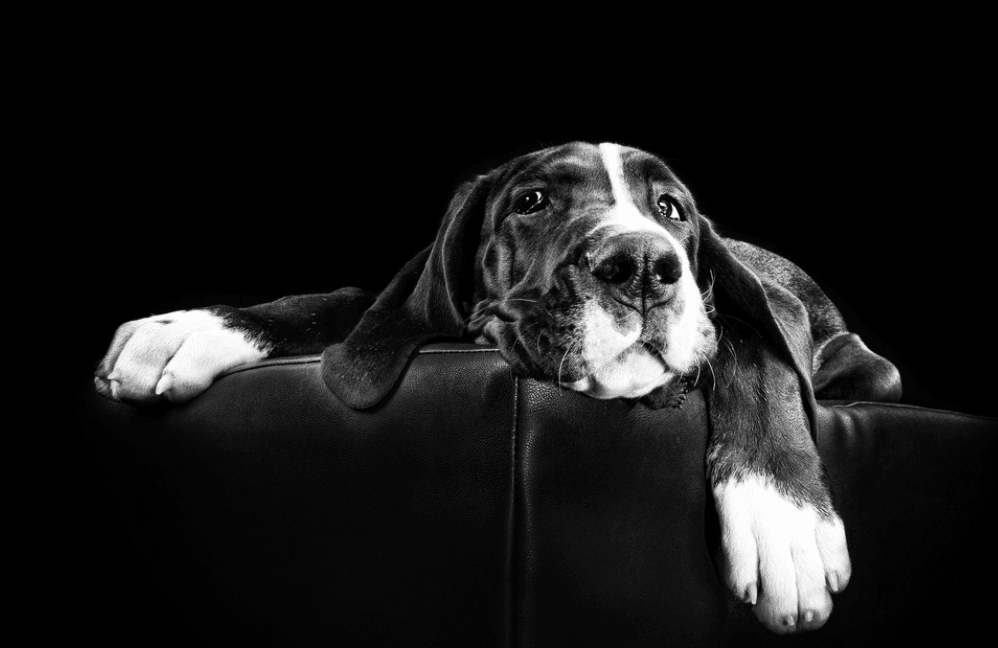
4 thoughts on “Great Dane Temperament: Get To Know Your Dog”